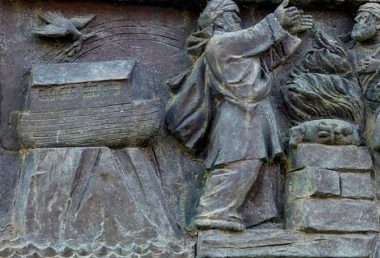Are there any Psalms about Noah?

To read this article in German, click here.
The following text is quoted from the Soncino edition of the Midrash Genesis (Bereishis) Rabbah, beginning of Chapter XXVI (p. 209-210).
1. Happy is the man that has not walked [in the counsel of the wicked, neither stood in the way of sinners, nor sat in the seat of the scornful]. (Ps. 1:1)
“AND NOAH WAS FIVE HUNDRED YEARS OLD; AND NOAH BEGOT SHEM, HAM AND JAPHETH” (Gen. 5:32).
“Happy is the man” (Ps. 1:1) refers to Noah; “that has not walked in the counsel of the wicked,” – [the Talmudic Sages] Rabbi Judah and Rabbi Nehemiah differ on this. Rabbi Judah said: It means through three generations, [namely], of Enosh, the Flood, and the Separations [of languages at the Tower of Babel].[1] Rabbi Nehemiah said: During the generation of Enosh he was but a child.[2]
According to Rabbi Judah’s view, “in the counsel of the wicked” refers to the generation of Enosh; “nor stood in the way of sinners“, to that of the Flood; “nor sat in the seat of the scornful,” to that of the Separation [of languages].
“But his delight was in the law of the L-rd…” (Ps. 1:2) alludes to the seven precepts [Noahide Commandments] which he was commanded.[3] “…but in His law does he meditate” (Ps. 1:2): he inferred one thing from another, arguing, “Why did the Holy One, blessed be He, order more pure animals [to be saved] than impure ones? Surely because He desires that offerings should be made to Him of the former. Forthwith, “He took of every pure beast etc. (Gen. 8:20).
“And he shall be like a tree planted by streams of water…” (Ps. 1:3): the L-rd planted [i.e. saved] him in the ark. “…that brings forth its fruit in its season” (Ps. 1:3): this alludes to Shem; “…and whose leaf does not wither“: to Ham; “…and in whatsoever he does he shall prosper” (Ps. 1:3): to Japeth. Thus it is written, “AND NOAH BEGOT SHEM, HAM AND JAPHETH”.
2. Planted in the house of the L-rd, they shall flourish in the courts of our G-d (Ps. 92:14)
“Planted in the house of the L-rd” alludes to Noah, whom the Holy One, blessed be He, planted in the ark; “…they shall flourish in the courts of our G-d“, as it is written, “AND NOAH BEGOT, etc.”; “They shall still bring forth fruit in old age…” (Ps. 92:15) alludes to Noah.[4] “…they shall be full of sap and richness” (Ps. 92:15), as it is written, “AND NOAH BEGOT SHEM, HAM AND JAPHETH”.
“AND NOAH WAS FIVE HUNDRED YEARS OLD, etc.” (Gen. 5:32). [The Sage] Rabbi Judan observed: all his contemporaries begot at a hundred or two hundred years, while he begot at five hundred years! The reason, however, is that the Holy One, blessed be He, said: “If they [Noah’s sons] are to be wicked, I do not desire them to perish in the Flood [5]; while if they will be righteous, am I to put him to the trouble of building many arks?” [6]
Therefore the L-rd stopped his fountain [of his seed] and he begot at five hundred years. Rabbi Nehemiah said in the name of Rabbi Eliezer the son of Rabbi Jose the Galilean: Even Japheth, who was the eldest [7], was not at the time of the Flood a hundred years old so as to be liable to punishment.[8]
Footnotes:
[1] Noah lived through these, yet did not imitate the evil ways of his contemporaries.
[2] Hence Scripture cannot refer to this.
[3] He was given an additional precept [beyond the 6 given to Adam], [namely], the injuction not to eat a limb torn from a living animal. [See The 7 Noahide Commandments – An Introduction]
[4] Who begot children when 500 years old (Gen. 5:32).
[5] For their father’s [Noah’s] sake.
[6] Had he begotten children at the normal age, there would have been too many by the time of the Flood for one ark. [Note that this shows that G-d assigned the building of the ark specifically to Noah.]
[7] Though he always comes last [when Noah’s three sons are listed in Genesis].
[8] It was a tradition that before the Flood, the Heavenly Court did not punish for sins committed before that age [i.e. the age of majority in the judgment of Heaven was 100 years].








